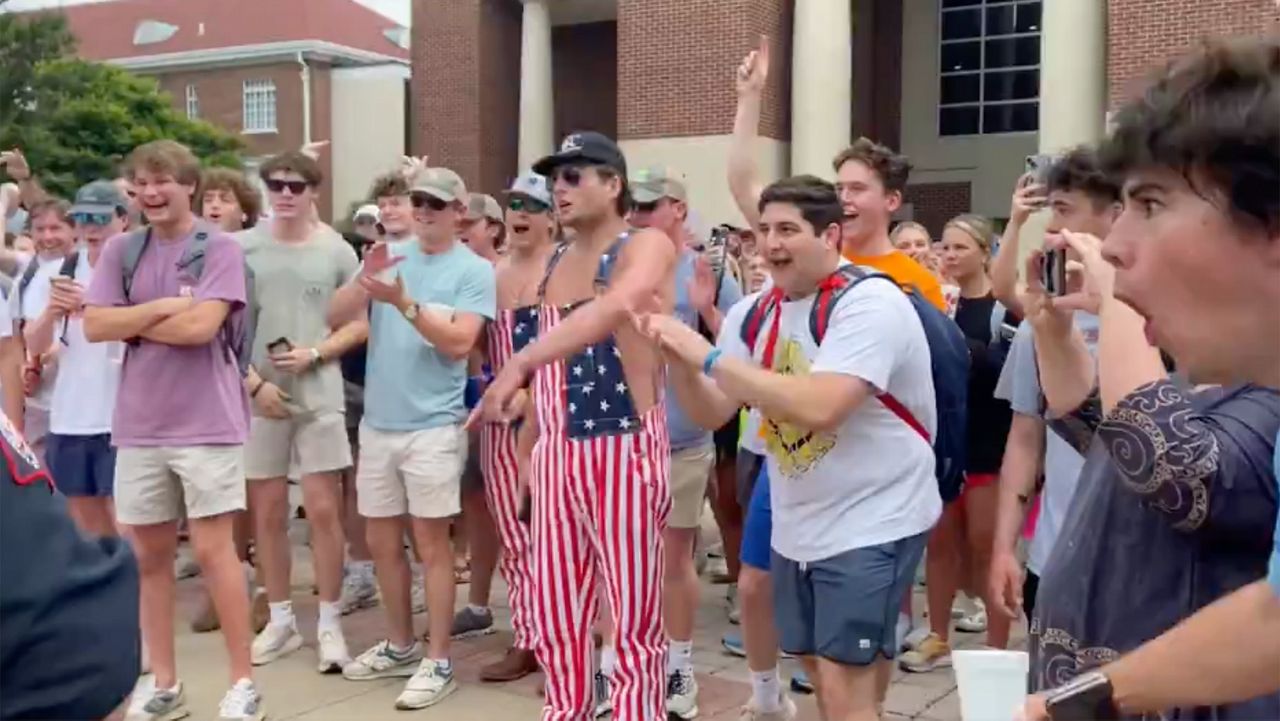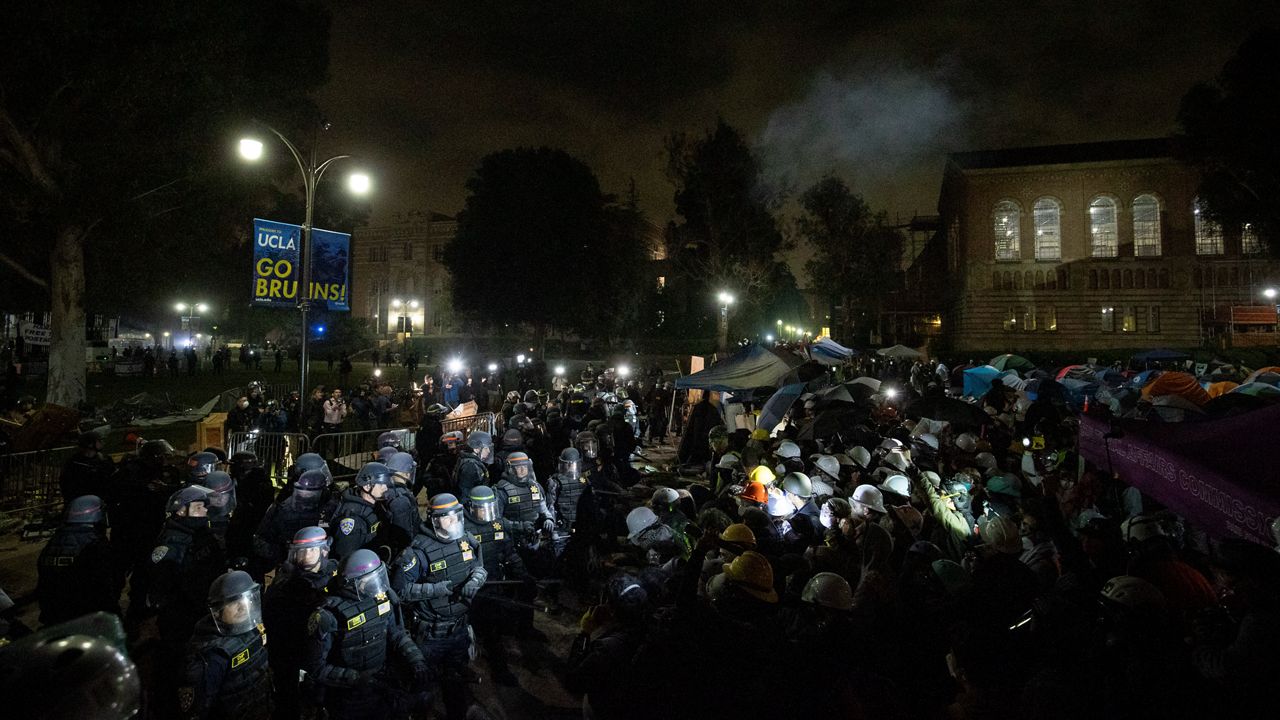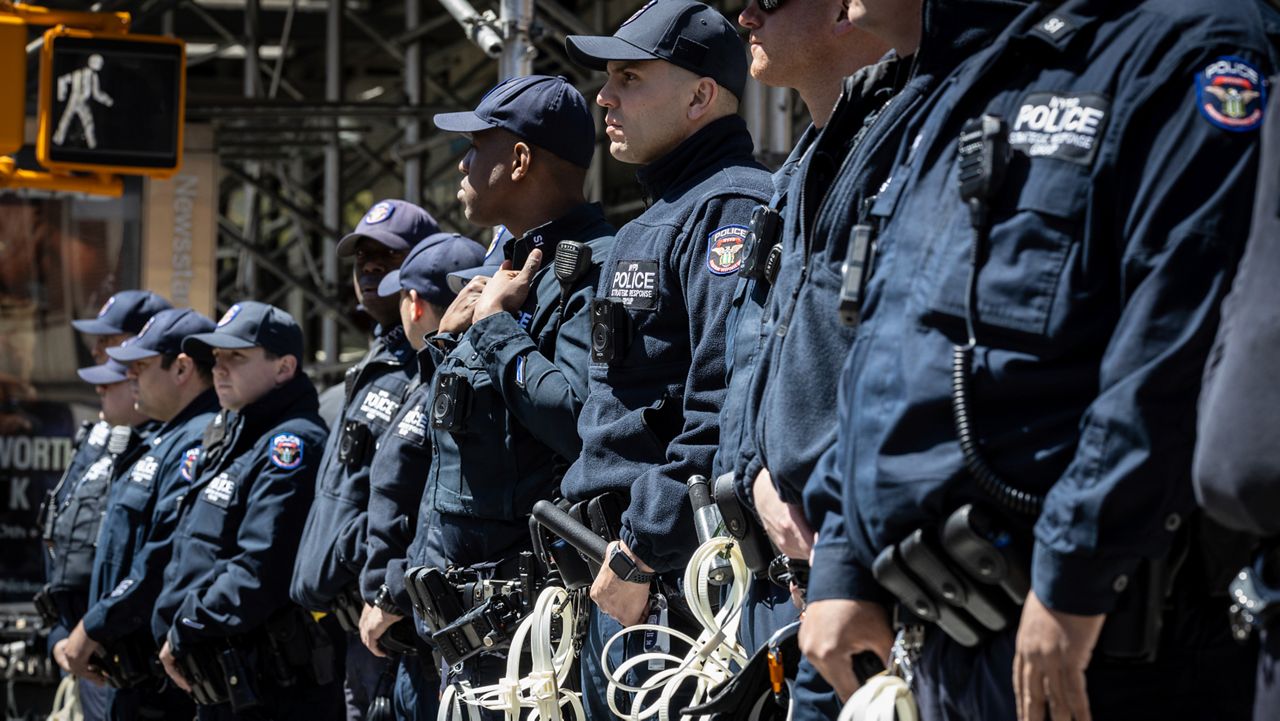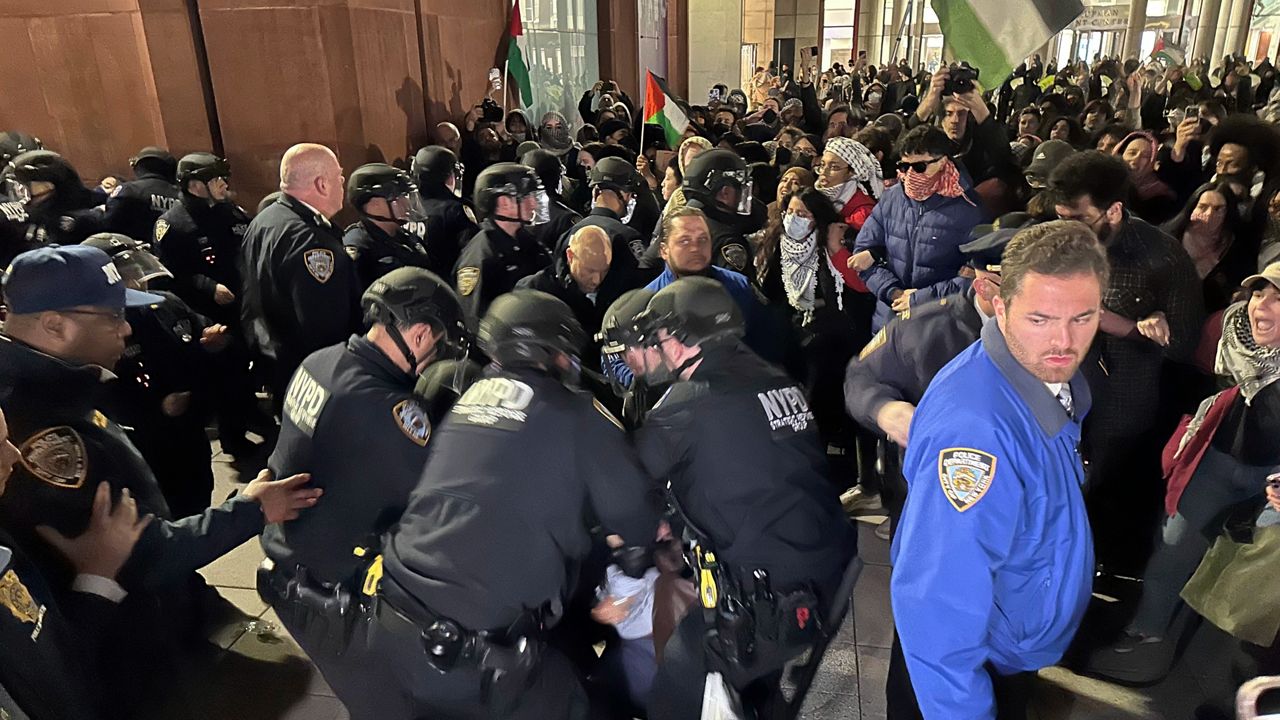As campus protests against Israel’s war in Gaza grip the country, House Speaker Mike Johnson, R-La., visited Columbia University in New York City on Wednesday to demand the university president’s resignation after meeting with her -- and to equate the student protestors who have built an encampment on campus to Hamas.
Johnson also said he would explore ways Congress could cut off federal funding to universities that fail to rein in protests.
What You Need To Know
- As campus protests against Israel’s war in Gaza grip the country, House Speaker Mike Johnson, R-La., visited Columbia University in New York City on Wednesday to demand the university president’s resignation after meeting with her
- He also equated the student protestors who have built an encampment on campus to Hamas
- Protestors have pushed back on the accusations of antisemitism, insisting antisemitic rhetoric has been used only by individuals unassociated with the main protest encampment on campus. The protest was organized in part by pro-Palestinian Jews
- The protestors at Columbia University and on dozens of other campuses across the country say they want their institutions to divest from weapons manufacturers and Israeli companies, and to denounce what the students and faculty members involved in the protests call a genocide in Gaza
“It’s detestable that Columbia has allowed these lawless agitators and radicals to take over,” Johnson said, calling on university president Columbia University President Minouche Shafik to resign. “The virus of antisemitism is spread across other campuses.”
“Columbia's administrators have chosen to let the threats, the fear and intimidation of the mob rule to overtake American principles like free speech and the free exchange of ideas and the free exercise of religion,” Johnson said of the largely peaceful protest which hosts nightly Muslim and Jewish prayers. This week, Jewish students involved in the pro-Palestinian protest movement held Passover seders.
Johnson and other congressional Republicans who joined him were greeted by boos, curses and chants from pro-Palestinian protestors. Journalists in person at the press conference said Johnson was occasionally inaudible amid the din.
“We can’t hear you,” the protestors chanted at one point.
The Louisiana Republican went on to describe the protests as “pro-Hamas,” citing a statement from the U.S.-branded terror group that said the protests were “helpful to our cause.” The protests are calling for an end to the conflict and for their universities to divest from Israeli companies and end their relationships with the Israeli government. Columbia University, for example, does not have relationships with Hamas that could be protested.
“If you want a cease-fire, the fastest way for a cease-fire to occur is for Hamas to surrender and to release the hostages,” Rep. Anthony D’Esposito, R-N.Y., said at the press conference. “And if you can't call for that, you are a pathetic embarrassment to this institution and to students everywhere. It is time for President Shafik to resign in disgrace.”
Last week, over 100 protesters were arrested at Columbia University for trespass, the New York City Police Department said. Mayor Eric Adams said at the time the arrests were made without incident. On Tuesday night, administrators gave protesters a midnight deadline to clear their encampment, but later agreed to another 48 hours to continue negotiations
“The president shares the representatives focus on and commitment to the safety and security of all members of the cannabis community. And she appreciates help from all of those who offer it,” Columbia University vice president for communications Ben Chang said during a virtual briefing after Johnson’s remarks. “As we are seeing on campuses from California to Texas, from Minnesota to Massachusetts, several universities are confronting immense and similar challenges.”
Protestors have pushed back on the accusations of antisemitism, insisting antisemitic rhetoric has been used only by individuals unassociated with the main protest encampment on campus. The protest was organized in part by pro-Palestinian Jews.
“More than 50 Jewish students were arrested alongside other students at this university,” one organizer said at a press conference earlier on Wednesday. “The university itself sicced the NYPD on Jewish students. So this is a safety concern that concerns us all.”
Elsewhere in New York on Tuesday night, 209 activists working with the group Jewish Voice for Peace were arrested for disorderly conduct as they protested the war outside Senate Majority Leader Chuck Schumer’s home. Schumer was in Washington, shepherding a foreign aid bill that included $26 billion in military aid for Israel and another $9 billion for humanitarian aid in Gaza. Biden signed the aid package into law on Wednesday morning.
The protestors at Columbia University and on dozens of other campuses across the country say they want their institutions to divest from weapons manufacturers and Israeli companies, and to denounce what the students and faculty members involved in the protests call a genocide in Gaza.
Israel’s six-month bombardment of Gaza — in retaliation for a Hamas attack last October that killed 1,200 Israelis and foreign nationals and saw around 250 taken hostage — has in turn killed at least 34,000 Palestinians, left tens of thousands more injured, displaced millions and pushed hundreds of thousands to the brink of famine. Women and children have died by the thousands, every university in Gaza has been destroyed and the U.N. reported the discovery of mass graves this week.
While at Columbia University, Johnson said he planned to call President Joe Biden, who has also condemned the protests, after leaving New York on Wednesday to demand he take action. He stopped short of calling on the president to send in the National Guard, but said “if these threats and intimidation are not stopped, there is an appropriate time for the National Guard. We have to bring order to these campuses. We cannot allow this to happen around the country.”
Sens. Josh Hawley, R-Mo. and Tom Cotton, R-Ark., along with Anti-Defamation League CEO Jonathan Greenblatt, had already called for the National Guard to quell the largely peaceful Columbia University protest.
Protest organizers said late Tuesday night that Columbia University administrators threatened to call the NYPD and the National Guard on them. Chang, the university vice president for communications, called the allegation “baseless” and “unsubstantiated” on Wednesday.
New York GOP Reps. D’Esposito, Nicole Malliotakis and Mike Lawler — as well as House Education Committee Chair Virginia Foxx, R-N.C. — also demanded Shafik to resign at the event. Shafik has been strongly opposed to the protests and worked to end them, but their continuation has shown the Republicans she “cannot control the campus,” as Malliotakis said during her remarks.
Shafik “cannot keep the students who are of Jewish faith, who pay a lot of money and have worked very hard to get to an Ivy League institution like this… she cannot keep them safe,” said Malliotakis, who represents Staten Island and part of Brooklyn.
Democratic New York Reps. Jerry Nadler, who is Jewish, and Adriano Espaillat denounced Johnson’s appearance, accusing him of failing to address antisemitism in his own party. Nadler noted Johnson just last week met with John Hagee, a pastor who believes Jews need to return to Israel to usher in the apocalypse and the second coming of the Messiah. He has also said Adolf Hitler and the Antichrist are both Jewish, and that Jews were to blame for the Holocaust for their “disobedience” to the “one true God.”
“You cannot simultaneously give a platform to extreme, far-right Christian nationalists one day and pay lip service to the Jewish community the next,” Nadler wrote on social media alongside a photo of Hagee and Johnson smiling together. “If the Speaker wants to actually combat antisemitism and not just score cheap political points, he must stop ignoring the antisemitism in his own party.”
Prior to Johnson’s press conference, student organizers and negotiators held a press conference of their own to lay out their demands and perspective.
“We've known across history, student movements have been at the forefront of social justice movements and in changing the tides,” one of the protest organizers said at their Wednesday press conference. “It's not just our universities, our universities are an emblem of the larger United States government and their own complicity in making money off of massacre.”
Protests continued to spread on Wednesday, with students at Harvard University, the University of Texas at Austin and the University of Southern California joining the dozens of universities and colleges that had mimicked the Columbia University protest — which itself was adopting tactics that had originated on other campuses, albeit garnering less national attention.
At UT-Austin, dozens of heavily armed police officers — including some with long-rifles — responded with force, arresting multiple protestors and fighting them armed with riot shields and batons, according to footage posted by local journalists, students and professors. Some of the dozens of Texas Department of Public Safety law enforcement officers were riding horses. At least 20 had been arrested as of Wednesday evening, according to the Houston Chronicle.
Over 120 students, faculty and fellow protestors were arrested at New York University on Monday night, the NYPD said. At least 60 were arrested at Yale University early Monday morning. And at the University of Minnesota, nine were arrested on Tuesday. Another member of Congress, Rep. Ilhan Omar, D-Minn., joined protesters there on Wednesday to show her support.
At California State Polytechnic University, Humboldt in northern California, campus remained closed on Wednesday, according to the university, after pro-Palestinian protestors seized a building and physically repelled riot police who attempted to retake it on Monday.










